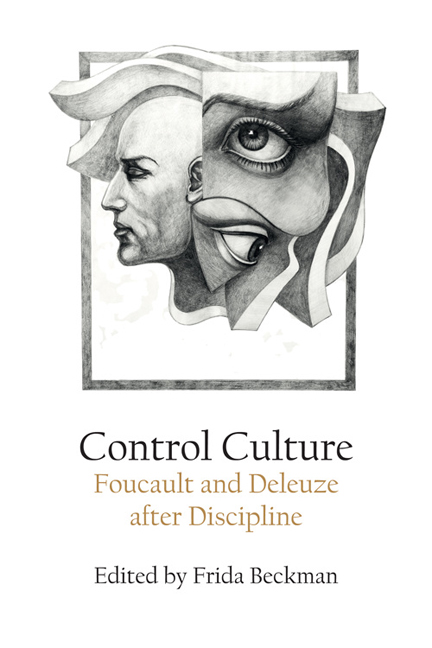Book contents
- Frontmatter
- Contents
- Acknowledgements
- Notes on Contributors
- Introduction. Control of What?
- 1 Notes from an Investigation of ‘Control Society’
- 2 Post-Mortem on Race and Control
- 3 Periodising (with) Control
- 4 Subjects of Sovereign Control and the Art of Critique in the Early Modern Period
- 5 Posthumanism, Social Complexity and the Political: A Genealogy for Foucault’s The Birth of Biopolitics
- 6 ‘That Path is for Your Steps Alone’: Popular Music, Neoliberalism and Biopolitics
- 7 Cinema in the Age of Control
- 8 Towards a ‘Minor’ Fascism: Panoptic Control and Resistant Multiplicity in TV’s Spooks
- 9 Species States: Animal Control in Phil Klay’s ‘Redeployment’
- 10 Control and a Minor Literature
- 11 Philosophy and Control
- Index
8 - Towards a ‘Minor’ Fascism: Panoptic Control and Resistant Multiplicity in TV’s Spooks
Published online by Cambridge University Press: 05 May 2021
- Frontmatter
- Contents
- Acknowledgements
- Notes on Contributors
- Introduction. Control of What?
- 1 Notes from an Investigation of ‘Control Society’
- 2 Post-Mortem on Race and Control
- 3 Periodising (with) Control
- 4 Subjects of Sovereign Control and the Art of Critique in the Early Modern Period
- 5 Posthumanism, Social Complexity and the Political: A Genealogy for Foucault’s The Birth of Biopolitics
- 6 ‘That Path is for Your Steps Alone’: Popular Music, Neoliberalism and Biopolitics
- 7 Cinema in the Age of Control
- 8 Towards a ‘Minor’ Fascism: Panoptic Control and Resistant Multiplicity in TV’s Spooks
- 9 Species States: Animal Control in Phil Klay’s ‘Redeployment’
- 10 Control and a Minor Literature
- 11 Philosophy and Control
- Index
Summary
INTRODUCTION: VELVETFASCISM
In ‘The Book’, Season 4, Episode 5 of television's Spooks, journalist Gary Hicks (Douglas Hodge) witnesses the murder of Clive McTaggart (Andrew Burt), a retired high-ranking intelligence officer who was about to publish his memoirs, which contain highly sensitive government secrets. Determined to see the book published but fearing that unnamed members of British intelligence may be attempting to suppress it, Hicks turns to Harry Pearce (Peter Firth), an old friend of McTaggart's and the current head of Section D, MI5's counter-terrorism unit. Their conversation provides a concise summary of the show's perspective on contemporary control culture and its relation to both Foucault's biopolitics and Deleuze and Guattari's analysis of post-World War II micro-fascism as a maintenance of peace based on perpetual fear, ‘giving any and everybody the mission of a self-appointed judge, dispenser of justice, policeman, the neighborhood SS man’ (1987: 228):
Hicks: He was getting more and more despondent about the way our political system's degenerated, you know. The lies, the spin, Iraq, the whole ‘politics of fear’ thing. Dirty bombs and all the other fantasies this government keeps coming up with to justify their existence and make themselves look like self-righteous heroes. He called it …
Pearce: ‘… Velvet Fascism’. I know. Although I doubt the people of Manhattan would necessarily agree with you.
Hicks: Please! 9/11 was the best thing that ever happened to you people.
Pearce: The line between fear and complacency is a thin one.
Hicks: But fear's much better when it comes to getting votes isn't it?
One is immediately reminded of Deleuze's oft-quoted statement on contemporary fascism in Two Regimes of Madness. Discussing accusations of anti-Semitism in Daniel Schmid's film, Shadow of Angels, Deleuze notes that old-style fascism (historically associated with Nazi Germany, Franco's Spain and Mussolini's Italy) looks positively quaint and folkloric in comparison to the current model:
The new fascism is not the politics and the economy of war. It is global agreement on security, on the maintenance of a ‘peace’ just as terrifying as war. All our petty fears will be organized in concert, all our petty anxieties will be harnessed to make micro-fascists of us; we will be called upon to stifle every little thing, every suspicious face, every dissonant voice, in our streets, in our neighborhoods, in our local theaters. (Deleuze 2006a: 138)
- Type
- Chapter
- Information
- Control CultureFoucault and Deleuze after Discipline, pp. 141 - 165Publisher: Edinburgh University PressPrint publication year: 2018



